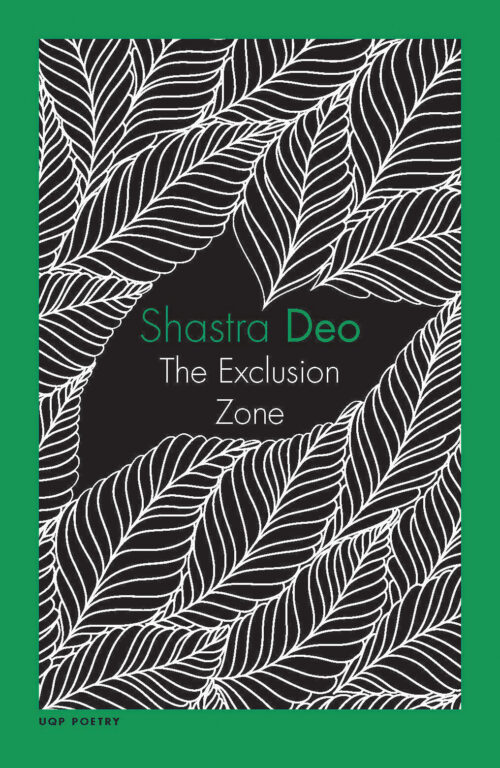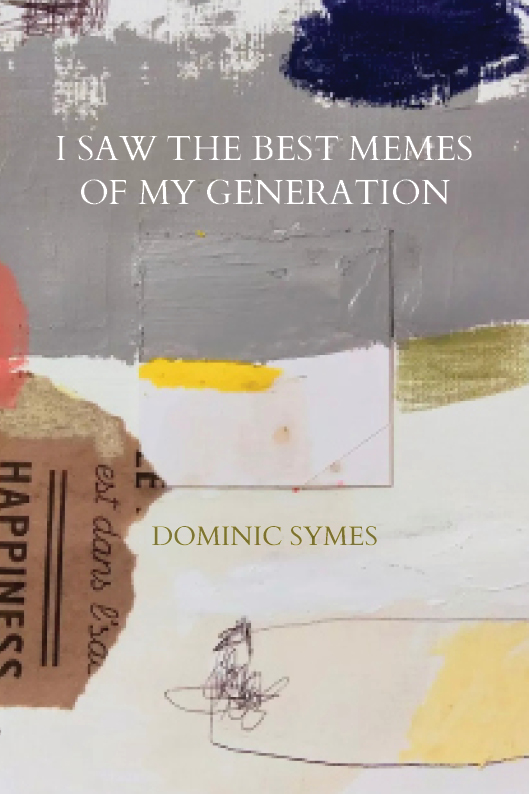
 The Exclusion Zone by Shastra Deo
The Exclusion Zone by Shastra Deo
University of Queensland Press 2023
I Saw the Best Memes of My Generation by Dominic Symes
Recent Works Press 2022
I spent much of 2023 inadvertently giving Shastra Deo’s The Exclusion Zone the silent treatment. I felt, for reasons now irrelevant, consigned to my own bathetic exclusion zone, as if the book were a forbidden, inaccessible text. So exclusive: as if to read The Exclusion Zone would be in violation of the text’s manifest function. “Geis [the ancient Celtic designation for a supernatural taboo] wherein nothing happens: not war, not song” (‘Irish Book of Spells,’ 33); for,
The poet carries language through international waters, will
never find the right words to quantify the extent
of their exposure to ionising radiation
(‘Irish Book of Spells,’ 32)
What’s the idea here? That no language can provide sufficient warning of (or protection against) the ultimate catastrophe — holocaust, ecological collapse, nuclear apocalypse? Holding this as if a just-ajar door to the collection, this idea of the poet who never found the right words, who might make nothing happen, I wasted months feeling I ‘understood’ the ‘point the book was making,’ while also feeling I ‘felt nothing’ about that point. I wrote a bunch of middling paragraphs about the book as comment on the insufficiency of language, and worse, some try-hard material on language-games that went (reliably) nowhere.
Then it was October, the review in its tenth month of lateness, and I began dreaming of the bombs. They’d fly into frame and then freeze, the vivid logos of Boeing and Lockheed Martin spacing out in primary colour before the void (when I woke). In this pattern of dreaming, a pathetic parallel to Gaza’s actual living nightmare, I picked up Deo’s book again. In the same poem, ‘Irish Book of Spells,’ I read, “[k]now that the poem is not about heroes. / That the poet may not gaze upon the bomb” (32).
To gaze upon the bomb: to aestheticise violence, whereby gazing transforms the barbaric and abominable object of warfare into an exemplary figure of culture. (A poem.) To gaze upon the bomb is to make poetry in the oldest available sense of the Western tradition of making it; this was, I think, W. H. Auden’s insight in the final stanza of ‘The Shield of Achilles’:
The thin-lipped armorer Hephaestos, hobbled away; Thetis of the shining breasts Cried out in dismay At what the god had wrought To please her son, the strong Iron-hearted man-slaying Achilles Who would not live long.
Thetis cries out in dismay, but all the while she has been looking over Hephaestos’ shoulder, gaze, gaze, gazing at the shield (the original bomb) — the very bomb she commissioned for her ‘man-slaying’ son. Gazing is collusive; has been since the Iliad. Poetry, far from being a humanising salvation against the violence of this world (where, as Auden writes in stanza five of the same poem, “barbed wire enclose[s] an arbitrary spot”), has had blood on its hands from the start. Here are the famous first sentences of Simone Weil’s legendary essay on that founding epic:
The true hero, the true subject, the center of the Iliad is force. Force employed by man, force that enslaves man, force before which man’s flesh shrinks away. In this work, at all times, the human spirit is shown as modified by its relations with force, as swept away, blinded by the very force it imagined it could handle, as deformed by the weight of the force it submits to.
(‘The Iliad, or the Poem of Force’ in On Violence: A Reader, 2007: 378)
Defining force as “that x that turns anybody that is subjected to it into a thing,” Weil gives us an idea of poetry’s protagonistic role in licensing and giving language to the violence of our pasts and presents, the literature of a warrior aristocracy forming our presiding cultural inheritance (378). Something is wrong inside our literature. Or, as the speaker in ‘Aubade (Earth-TRN688)’ has it: “something wrong THERE IS NOTHING WRONG wrong / inside of me” (15).
For another way into the idea of poetry’s program of thingification, consider José Ortega y Gasset’s idea that metaphor is the “most radical instrument of dehumanisation,” the mental act that Giorgio Agamben describes as the “[substitution] not so much in order to reach the second, as to escape the first” (‘The Dehumanization of Art’ in The Dehumanization of Art and Other Essays on Art, Culture and Literature, 2019: 35; Stanzas: Word and Phantasm in Western Culture, 1993: 32). In Deo’s ‘Post-detonation Linguistics,’ the speaker declares:
Fact: things are like other things. Supposition: liking tweets is like a simile. A house on fire. Like an inconsequence. My love is like a rose. Birdsong like a car alarm. My love is like a transuranic element. (8)
Like as in like, as in, a house on fire deposited in the heart of the poetic act. The regressive substitution. Things are like other things (and more to the point, like lesser things); or, in other words, ‘liking,’ in the sense of comparison, performs a principal role in the theatre of thingification. ‘Liking tweets’ could be seen in the sense that Michael Taussig once described as being “all over the Internet” — this not only working as a way of “removing something from sight but [also the] instant death of the spirit and imagination” (‘Two Weeks in Palestine: My First Visit’ in The Corn Wolf, 2015: 131; 131). (Taussig continues: “which reminds me of the many e-mails I have received, ending with ‘have a great time in Palestine’” (131).) Nothing for something; the basis for poetry (simile, metaphor) provides only spurious remedies to that which ails us (destruction). If poetry sets out to wage war against the deprivations and spoilings of time, what survives is always different to what was purportedly meant to be saved. Car alarms for birdsong.
What will we do when the last birdsong is replaced by car alarms and then the nothing-sound of nuclear fallout? Is there any way out of this, and does poetry have anything to do with finding this way? What does it mean to proclaim the geis, the injunction that ‘the poet may not gaze upon the bomb’? Is this what The Exclusion Zone means to do, to break one geis to keep another? If the poet may not gaze upon the bomb, then they must find a way to be poets without poetry (that is, without, or against poetry’s constitutive violence), or, they must find a way to use poetry against poetry, scooping out meaty deposits of language where something might be saved, in order that we might do something differently and, hopefully, more effectively in the future. To exclude the poet from their rightful history (the history of poetry) is to place them in the zone of apotropaic magic, that is, to invoke one of the oldest forms of magic there is (the use of one magic to protect against another magic).
Such a poetry would have to find a way to address the “anthropological machine” that is language, which “produces humanity by denying it to others, that subtracts humanity from a figure and leaves its edges undefined, so that that body begins to leak into a landscape,” as Steven Maye writes of Bhanu Kapil’s Ban en Banlieue (‘Bhanu Kapil, Ban en Banlieue,’ Chicago Review 60, 2016: 176; 176). “They are human animals,” said Israeli Defence Minister, Yoav Gallant (an invocation if ever there was one). Poetry against poetry is magic against magic. Poetry could be exclusion against the originary exclusion of the anthropological machine; such a poetry means to protect us from the violence of poetry:
you left the body in the mountains. no incense for your brother, no burial. goneness of him clean and hot. the body was not his, nor was it yours to take: gunshot, frenzy, spilt intestines rime-crisp. cheek frozen to frost earth. no meat wasted, come spring. This is not an escape so much as a mourning of such tender want. (‘The Question of the Ethical Shot,’ 55)









